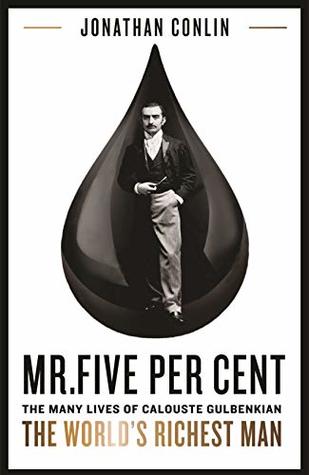That being said, I got the kindle version of the Conlin book and found that it was very hard to read and took a long time to finish. Tom's opinion was that Conlin was a very good scholar, with which I had to agree. He had to do a lot of research to gather all of the information that he had in his book. However, he would have been well served by getting a good editor to 'fix' the book. There were some sections where Conlin did not maintain a good chronological progression - he jumped back and forth way too much and he didn't need to.
As to the content and the discussion: we all pretty much agreed that Gulbenkian seemed to have been a very good business man. Some people thought that it was interesting that his family had been involved in more traditional Armenian business, such as oriental carpets, but he abandoned that to focus on oil. We thought that it was impressive that he was able to get agreements which paid him 5% of all of the oil pumped from the former Ottoman Empire, especially that he went out of his way to include the full Arabian peninsula in his contractual area when everyone else was of the opinion that there was no oil in Saudi Arabia.
We discussed his life. He was born in Constantinople in 1869 into a rich Armenian family. He was sent to school in London. Later he established a family business office in London and then in Paris. For many years, until World War II, he lived in Paris. In his last few years he moved to Lisbon.
One area of discussion was that, while he didn't hesitate to make charitable contributions, he never seemed to make it a priority to contribute to Armenian causes.
Comments were made on his family life. While he married only once and remained married to the same woman for over 60 years, they lived apart after the first couple of years. He had two children, a boy and a girl. He brought his son into the family business, but had continual conflicts with him. His daughter was upset that far more attention was paid to the son and that he was given many more opportunities for education and travel.
Andrea commented on the apparently immoral lifestyle that Gulbenkian led, with a constant stream of young women in his bed while he was living in Paris.
The other major aspect of Gulbenkian's life was his great interest in art. He started buying major paintings and sculptures early on and continued for his entire life. He bought many items from the Hermitage after the Russian revolution when the new government was trying to raise money and had no interest in keeping useless art items. In the last few years of his life there were major conflicts between the British, French, American and Portuguese governments as to where his art collection would end up.
With that, I'll end my report. Next month's meeting will be on February 20th, location TBD. I hope to see you there.
Leroy Erickson
 The ACOM Book Club met on Thursday, January 16, 2020, at the Bulbulian house. In attendance were Francis, Jim, Margaret, Kass, Tom, Andrea, Lowell and me. (Barb was around, too, but didn't take part in the discussion.) This month's book was "Mr Five Per Cent" by Jonathan Conlin, a biography of Calouste Gulbenkian.
The ACOM Book Club met on Thursday, January 16, 2020, at the Bulbulian house. In attendance were Francis, Jim, Margaret, Kass, Tom, Andrea, Lowell and me. (Barb was around, too, but didn't take part in the discussion.) This month's book was "Mr Five Per Cent" by Jonathan Conlin, a biography of Calouste Gulbenkian.